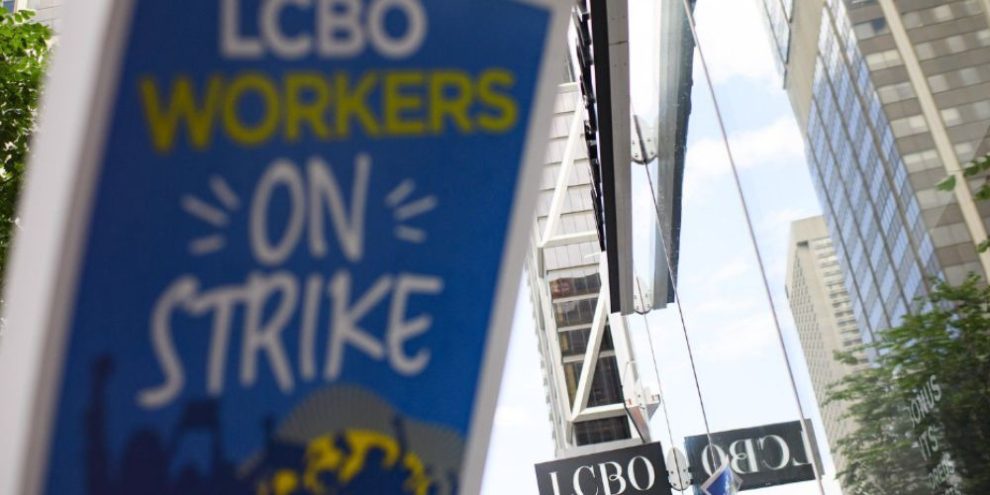
Updated July 15, 2024 @ 5:04pm
Ontario Premier Doug Ford's government is rushing to get ready-to-drink cocktails on grocery store shelves amid a strike at the province's main liquor retailer that has focused on that very issue.
Finance Minister Peter Bethlenfalvy announced Monday that grocery stores already licensed to sell beer and wine can start ordering the pre-mixed cocktails, as well as large packs of beer, to sell starting on Thursday – sooner than the planned Aug. 1 launch of that step.
"Our government is keeping our promise to give people in Ontario choice and convenience while supporting Ontario-made beverage producers across the province, including the Ontario businesses that produce more than 80 per cent of the ready-to-drink beverages sold here in our province," Bethlenfalvy wrote in a statement.
The sped-up move is part of an already fast-tracked plan to expand alcohol sales in the province. Ford's previous plan was to get beer, wine and ready-to-drink cocktails in convenience stores and all grocery stores by 2026, but in May he announced that would instead happen this year.
Leadership at the Ontario Public Service Employees Union, whose approximately 10,000 workers at the Liquor Control Board of Ontario walked off the job July 5, has said wages are not the main issue in the labour dispute, rather it is the expanded sale of ready-to-drink cocktails.
Previous rounds of alcohol market expansion in Ontario have kept spirits sales in the hands of the LCBO, and OPSEU worries undoing that will threaten the LCBO and union jobs.
Getting ready-to-drink beverages in grocery stores even sooner is an attempt to undercut the LCBO and amounts to interfering in bargaining, said OPSEU president JP Hornick.
"Ford is clearly trying to deliver on a promise he made to prospective corporate donors from the convenience and grocery industries during the elections," Hornick wrote in a statement.
"Doug Ford should stop playing politics with the lives of our members and taxpayers’ money."
The LCBO – which shut all stores when the strike began – had planned on opening 32 locations with limited hours two weeks into the labour dispute, but announced Sunday it was scrapping that plan to instead enhance service for bars and restaurants. The LCBO is still taking online orders and says those are being fulfilled within a week.
Ford and his government have also taken pains to highlight the various ways people can buy beer and wine during the strike, including creating an online map pointing consumers to outlets such as grocery stores and private bottle shops.
Ford has denied he is trying to dismantle or privatize the LCBO and government officials have noted that LCBO revenues have increased through previous rounds of alcohol sales expansions.
Bethlenfalvy has directed the Crown corporation to showcase and promote Ontario beer, wine, spirits and ciders as part of the expansion, and he has said it will still have an important role as a wholesaler.
Ford last week firmly ruled out a reversal on the ready-to-drink expansion, saying the ship had sailed "halfway across Lake Ontario."
The 450 grocery stores across the province that are already licensed to sell beer, wine and ciders can begin placing orders for the coolers and seltzers on Thursday and can sell the beverages as soon as they receive them.
A spokesperson for the Retail Council of Canada said consumers likely won't see the products in stores right away.
"When you factor in shipping and other logistics, it will take time to see these on stores shelves," Michelle Wasylyshen wrote in a statement.
"Grocers continue to work on implementation as there are many moving parts and complexities in order to get this up and running."
Some stores are seeing higher demand for beer and wine amid the LCBO strike, but there have not been any significant supply issues, she added.
Licensed grocery stores will also be able to sell larger packages of beer, such as cases of 24, starting Thursday.
An agreement the former Liberal government signed with The Beer Store in 2015 as it expanded sales of beer and wine into grocery stores gave the company exclusive rights to sell 12- and 24-packs of beer.
It had been set to expire at the end of 2025, but Ford's sped-up plan involves an “early implementation agreement” with The Beer Store that involves the province paying the company up to $225 million to help it keep stores open and workers employed. The province is also giving brewers a rebate on an LCBO fee that normally brings in $45 million a year, and it is giving retailers a 10-per-cent wholesale discount.
Under Ford's plan, convenience stores will be allowed to sell beer, wine and coolers starting Sept. 5 while newly licensed grocery stores can do so starting Oct. 31.
This report by The Canadian Press was first published July 15, 2024.





